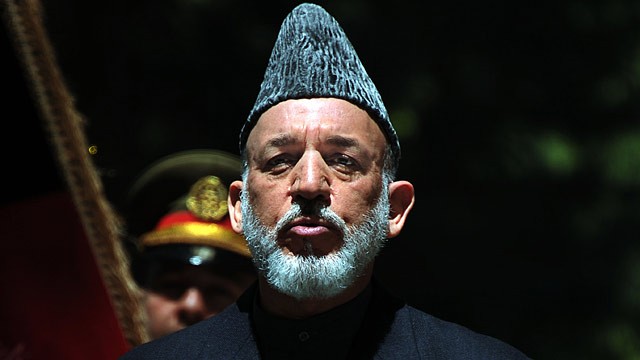M WAQAR..... "A man's ethical behavior should be based effectually on sympathy, education, and social ties; no religious basis is necessary.Man would indeed be in a poor way if he had to be restrained by fear of punishment and hope of reward after death." --Albert Einstein !!! NEWS,ARTICLES,EDITORIALS,MUSIC... Ze chi pe mayeen yum da agha pukhtunistan de.....(Liberal,Progressive,Secular World.)''Secularism is not against religion; it is the message of humanity.'' تل ده وی پثتونستآن
Sunday, May 13, 2012
Hamid Karzai Announces New Phase of Transition, Peace Process Suffers Another Blow
It seems Afghan President Hamid Karzai just can't win.
On a day meant to showcase the strength of the country's armed forces -- with an announcement that the next phase of the transition from NATO foces would eventually see 75 percent of the country under Afghan control -- a high profile assassination served as a grim reminder that the war is far from over.
Phase Three, or Tranche Three as it was announced, will see the transition of 122 more districts across the country to Afghan command.
Included in the transition is the full handover of Kapisa, Uruzgan, and Parwan provinces. The French currently maintain a force of 3,400 soldiers in Kapisa.
Afghan officials said the third phase of transition could take as little as six months. Handing over control to Afghan security will allow French president elect Francois Hollande to make good on his promise to pull his troops out by the end of the year.
Phase three of the transition also includes handing control of provincial capitals across the country to local security.
It's a significant move for Afghanistan's 330,000-member security forces, who have been dogged by a wide range of criticism, including cronyism, ineptitude, and divided loyalties.
NATO and its allies were quick to boast.
"Tranche III! Tranche III! Tranche III!!!" The U.S. Embassy in Kabul tweeted as soon as the announcement was made. Other leaders praised the training and preparedness of the Afghan army.
The transition "is a testament to the capacity and capability of the Afghan National Security Force" said U.S. Gen. John Allen, the commander of all international forces in Afghanistan."Afghanistan continues to move forward in security the sovereign future of their country," he said. "This is another step in bringing the hope of greater prosperity to the Afghan people."
But even as U.S. officials celebrated that new hope, the increasing menace of an insurgency that shows no signs of abating cast its shadow once again, this time, striking at the very heart of Karzai's vision for peace.
A high ranking member of Karzai's hand-picked High Peace Council -- the body charged with spear-heading reconciliation with the Taliban -- was gunned down in broad daylight.
Arsala Rahmani, a former deputy minister under the Taliban regime, was on his way to work when his car was stopped in traffic.
According to Kabul's police chief, an unidentified gunman pulled up in a Toyota Corolla, and fired a single shot from a firearm equipped with a silencer.
The bullet pierced Rahmani's arm, then entered his chest. The attack was so precise -- and so sudden -- that his own driver wasn't sure Rahmani had been hit. He later died in hospital.
Rahmani was seen as a key figure in luring the Taliban to the negotiating table.
In 2011, the Karzai administration arranged for his removal from a U.N. blacklist, allowing him to serve in an official capacity on the High Peace Council.
As a former deputy minister, he maintained contact with several high-level Taliban leaders, and expressed hope that the Taliban could eventually be convinced to end their decade-long insurgency.
Initial speculation about responsibility for the attack fell to the Taliban, who had announced that they would target High Peace Council members as part of their annual "spring offensive."
But in mild surprise, a Taliban spokesman today denied responsibility, saying the insurgent group wasn't responsible for Rahmani's death.
It marks the second time in just the last few months that an influential member of the High Peace Council has been assassinated. Burhanuddin Rabbani, the head of the council, was assassinated last September by a man carrying a bomb in his turban.
Rahmani's killing, carried out in daring fashion with the assailant still unknown, is another setback for Karzai, who has maintained that the only way to a lasting peace in Afghanistan is for the insurgency to end.
Subscribe to:
Post Comments (Atom)


No comments:
Post a Comment